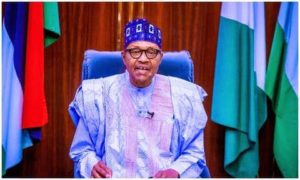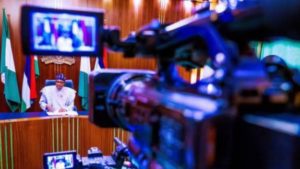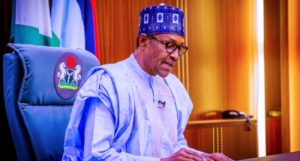Nigeria’s President, Muhammad Buhari has defended the current hike in the prices of petrol in the country, rationalizing the widely-criticized increment on the need to shore up the country’s “drastically reduced resources”.
President Buhari offered the justification when he delivered a nationwide broadcast on Thursday, October 1st, to mark the country’s 60th Independence anniversary.
He defended the new price of fuel in the country, claiming that a dependable government must face up to its responsibilities, especially in the midst of massive challenges.
In his speech, the President said government must take harsh decisions in order to solve the country’s economic problems.

Comparing the prices of petroleum products in Nigeria to those that obtain in neighbouring countries, the President of declared it made no sense for oil to be much less expensive in Nigeria than what obtains in other oil-producing countries that are Nigeria’s neighbours.
According to the President, maintaining the recent level of petroleum prices in Nigeria is no longer logical. Since assuming Office, he said, his government has acknowledged the economic reasons advanced to oppose modifying the price of petroleum but that it had to take drastic action on the prices of petroleum products at this time in view of the country’s mounting economic challenges.
Petrol presently retails for between N157 and N161 in Nigeria. Buhari said these rates are still reasonable compared to the prices of the same products in other oil-producing nations such as Saudi Arabia, and some of Nigeria’s oil-producing neighbors.

“It makes no sense for oil to be cheaper in Nigeria than in Saudi Arabia,” Buhari said. According to him the current oil price in Saudi Arabia, one of the largest oil producers in the world, is the equivalent of N168 per liter. Chad, which is an oil-producing country that shares a border with Nigeria retails petroleum at N362 per litre. Niger, also an oil-producing country that is one of Nigeria’s neighbours, sells one litre of petroleum at N346. In Ghana, another oil-producing country and also Nigeria’s neighbor, the petroleum pump cost is N326 per litre.
The National Labour Congress (NLC), the foremost Labour organization in Nigeria, in Nigeria had earlier scheduled a national protest and strike over the rise in electricity tariffs and petroleum pricesin the country.
The Nigerian Labour Congress (NLC) and the Trade Union Congress (TUC), another umbrella labour organization, postponed the strike after a late-night discussion with a federal government team at the presidential villa in Abuja, Nigeria’s capital, on the eve of the October 1st date of the planned protest.

Also in the same broadcast, the President also called for an intense “process of national recovery” as the nation celebrates the 60th anniversary of its October 1st, 1960 independence from Great Britain.
The President said recovery he proposed is essential, as the nation has always concentrated on “contrived fault-lines” that have been “allowed unnecessarily to fester.”
“We need to begin a sincere process of national healing and this anniversary presents a genuine opportunity to eliminate old and outworn perceptions that are always put to test in the lie they always are,” the President said.
He claimed that to obtain an outstanding country as Nigerians desire, the citizens must strengthen their commitment and motivate each other to do that which is moral and proper, “even when no one is watching”